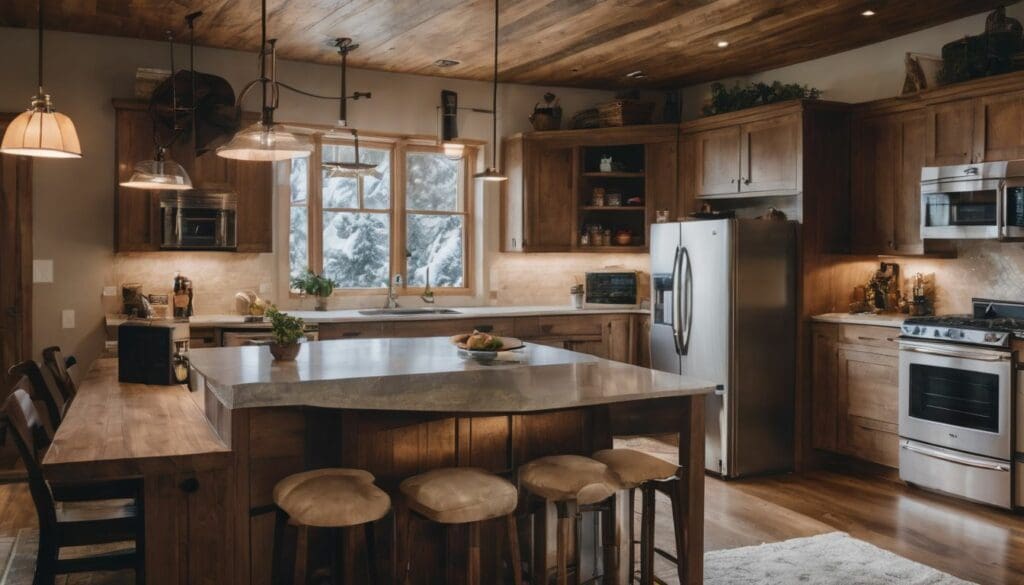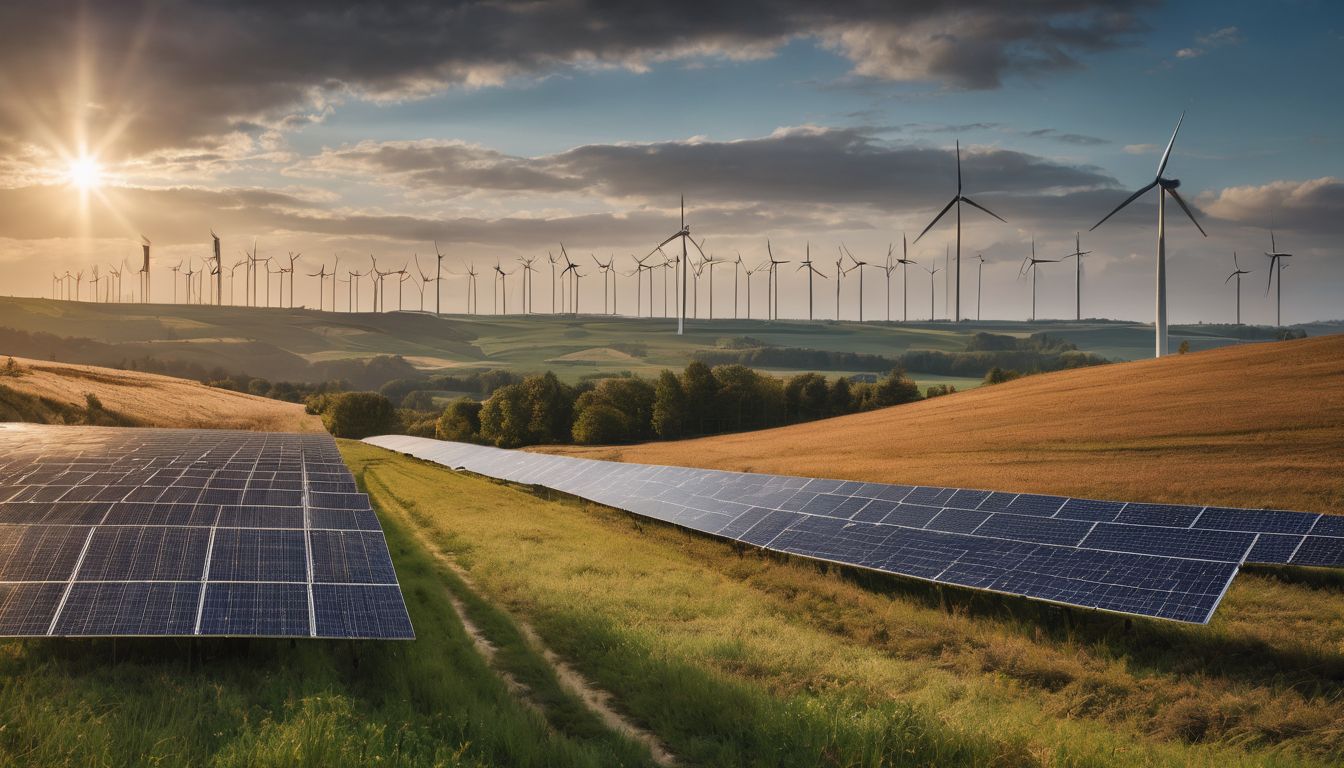Are your energy bills soaring through the roof? It’s a fact: homes can lose up to 30% of their heat due to poor insulation. This article is your guide to tackling this challenge, offering real-world solutions that improve your home’s energy efficiency.
Let’s make savings shine!
Key Takeaways
- Home energy efficiency means using less energy to maintain comfort, cutting costs and helping the environment.
- Simple actions like switching to LED bulbs or more significant steps such as adding insulation improve efficiency.
- Financing options are available for making eco – friendly home improvements more affordable.
- Energy – efficient homes can enjoy higher property values and better indoor air quality.
- Renewable energy sources like solar panels further decrease household reliance on fossil fuels.
What is Home Energy Efficiency?
Home energy efficiency refers to the practice of using less energy to achieve the same or better levels of comfort and functionality in a home. It involves implementing measures and upgrades that reduce energy consumption, lower utility bills, and minimise environmental impact.
Definition
Home energy efficiency means using less power to perform the same tasks in your house, reducing waste and saving on utility bills. It includes everything from simple actions like switching to LED bulbs to larger investments such as installing solar panels or upgrading insulation.
A home that operates with high energy efficiency uses less electricity, gas, or other fuels for heating, cooling, lighting, and running appliances. This not only conserves our planet’s resources but also slashes energy costs for homeowners.
Creating an efficient living space isn’t just good for your wallet; it benefits the environment by cutting down greenhouse gas emissions and dependence on non-renewable energy sources.
Up next: exploring the numerous benefits of making your home more energy efficient.
Benefits of Energy Efficiency
Improving energy efficiency not only reduces your carbon footprint but also saves money in the long run. Efficient use of energy helps in preserving natural resources and reduces environmental impact. Here are some benefits of energy efficiency:
- Reduces energy costs: By improving energy efficiency, you can significantly lower your monthly utility bills and save money.
- Minimises environmental impact: Energy-efficient homes consume less power, reducing the demand for fossil fuels and cutting down on greenhouse gas emissions.
- Enhances home comfort: Proper insulation, efficient windows, and other energy-saving upgrades can improve indoor comfort by maintaining consistent temperatures throughout the house.
- Increases property value: Energy-efficient homes are more attractive to potential buyers and can command higher resale values.
- Promotes sustainable living: Adopting energy-efficient practices at home contributes to a greener lifestyle and supports global efforts towards sustainability.
- Creates a healthier environment: Energy-efficient homes often have better indoor air quality, promoting a healthier living space for you and your family.
- Boosts economic growth: Supporting energy efficiency initiatives stimulates job creation in the clean energy sector and drives economic development.
- Contributes to climate change mitigation: Reduced energy consumption directly correlates to a decrease in greenhouse gas emissions, aiding in combating climate change.
Importance of Improving Energy Efficiency
Improving home energy efficiency is crucial for reducing environmental impact and lowering utility costs. Enhanced energy efficiency not only decreases greenhouse gas emissions but also promotes a more sustainable lifestyle.
By embracing energy-efficient upgrades and renewable sources, households can actively contribute to the preservation of natural resources while enjoying long-term financial savings.
Reducing home energy consumption through practical measures such as weatherisation and efficient appliances directly benefits both individuals and the environment. Optimising energy use at home aligns with a commitment to environmentally friendly practices and contributes to a healthier planet for future generations.
How to Improve Home Energy Efficiency
Conduct a home energy audit to identify areas of improvement, such as insulation and air leaks. Implement energy-saving upgrades like LED lighting, smart thermostats, and efficient appliances.
Consider using renewable energy sources like solar panels to further reduce energy consumption.
Conducting a Home Energy Audit
To conduct a home energy audit, start by examining all aspects of your home’s energy usage. Begin with an assessment of your heating and cooling systems to identify any inefficiencies.
- Check for air leaks around windows, doors, and other openings that may lead to energy wastage.
- Inspect the insulation in your attic, walls, and floors to ensure it meets recommended standards for energy efficiency.
- Assess the efficiency of your lighting and appliances to determine if they are consuming excessive energy.
- Consider using a thermal imaging camera to identify areas of heat loss within your property.
Implementing Energy-saving Upgrades
To improve home energy efficiency, implementing energy-saving upgrades is crucial. Here are some effective ways to achieve this:
- Upgrade to energy – efficient appliances such as refrigerators, washing machines, and dishwashers.
- Install programmable thermostats to regulate heating and cooling systems efficiently.
- Replace traditional incandescent bulbs with LED or CFL bulbs for more energy-efficient lighting.
- Seal air leaks in windows and doors to prevent heat loss and reduce energy consumption.
- Add insulation to walls, floors, and attics to maintain a comfortable temperature indoors.
- Install low – flow showerheads and faucets to conserve water and reduce hot water usage.
Using Renewable Energy Sources
Using renewable energy sources is a key aspect of improving home energy efficiency:
- Install Solar Panels: Harness the power of the sun by installing photovoltaic panels on your roof to generate clean, sustainable electricity.
- Utilise Wind Turbines: Consider incorporating small wind turbines to capture wind energy and convert it into electricity, especially if you live in a windy area.
- Geothermal Heat Pumps: Tap into the constant temperature beneath the earth’s surface to provide heating, cooling, and hot water for your home in an eco-friendly way.
- Biomass Heating Systems: Explore the use of organic materials such as wood or agricultural waste to generate heat and power for your home.
- Hydropower Systems: If you have access to a river or stream on your property, consider integrating a micro-hydropower system to produce clean electricity.
- Community Renewable Energy Projects: Participate in or support local community efforts for renewable energy generation through cooperatives, community solar projects, or shared ownership of renewable installations.
The Role of Building Design in Energy Efficiency
Building design plays a crucial role in energy efficiency, with features such as insulation and efficient windows helping to reduce energy consumption. To learn more about how building design impacts home energy efficiency, keep reading!
Insulation
Proper insulation is essential for maintaining a comfortable and energy-efficient home. Insulation helps regulate indoor temperature, reduces heat loss in winter, and prevents heat gain in summer, ultimately lowering energy consumption.
By installing high-quality insulation materials such as fibreglass, cellulose, or foam, homeowners can significantly improve their property’s overall energy efficiency.
In addition to adequate insulation, efficient windows also play a crucial role in reducing energy usage within homes. Upgrading to double-glazed or low-emissivity windows can further enhance the thermal performance of a property.
Efficient Windows
Moving from insulation to windows, another important factor in home energy efficiency is the installation of efficient windows. By using double or triple-pane glass with insulating gas between layers, these windows can significantly reduce heat transfer and air leakage.
Low-emissivity coatings on the glass also help to block ultraviolet rays and minimise heat loss during cold weather while keeping out unwanted heat during warm weather.
Additionally, installing energy-efficient windows not only lowers utility bills but also enhances indoor comfort by reducing draughts and noise pollution. Combined with proper insulation, efficient windows contribute to creating a more sustainable and eco-friendly home environment for environmentally conscious individuals seeking to reduce their carbon footprint and support conservation efforts through simple yet impactful initiatives.
Financing Energy Efficiency Projects
Explore options like energy-efficient mortgages, loans, PACE programs, and on-bill financing to help fund your home energy efficiency improvements. Learn more about how these financing options can support your sustainability goals.
Energy-efficient Mortgages
Energy-efficient mortgages offer a way for environmentally conscious homeowners to finance energy-saving upgrades. These mortgages are specifically designed to help individuals invest in sustainable home improvements such as solar panels, insulation, or efficient heating and cooling systems.
By linking the cost of these upgrades to the mortgage itself, homeowners can benefit from lower utility bills without bearing the full financial burden upfront.
This financing option aligns with an eco-friendly lifestyle and reduces home energy consumption over time. Additionally, it provides an opportunity for homeowners to contribute towards environmental conservation while enjoying the long-term benefits of reduced energy usage and costs.
For those looking to make their homes more sustainable, energy-efficient mortgages present a practical solution that supports both environmental consciousness and financial savings.
Loans
When considering financing options for home energy efficiency projects, individuals can explore various loan programmes designed to support energy-saving upgrades. These loans provide financial assistance for initiatives such as installing solar panels, upgrading HVAC systems, or improving insulation.
Energy-efficient mortgages are an option that allows homeowners to finance both the purchase of a new home and the cost of recommended energy improvements.
Another financing avenue is Property Assessed Clean Energy (PACE) programmes, which offer long-term loans to fund renewable energy and energy efficiency projects. On-bill financing is another accessible option where the cost of upgrades is repaid through utility bills.
PACE Programs
Transitioning from financing through loans to another energy efficiency program, Property Assessed Clean Energy (PACE) Programs offer an innovative way for homeowners to finance energy-efficient upgrades.
PACE allows property owners to fund projects such as solar panel installations or insulation improvements by securing a special assessment on their property and making repayments through their property taxes.
This unique method makes it easier for homeowners to invest in sustainable energy solutions without the need for upfront costs.
With PACE Programs, homeowners can access long-term financing options with competitive interest rates, allowing them to improve home energy efficiency without affecting personal credit scores.
On-bill Financing
On-bill financing allows homeowners to fund energy efficiency upgrades with a loan that is repaid through their utility bills. This method helps spread the cost of improvements over time, making it more manageable for homeowners.
With on-bill financing, individuals can invest in energy-saving measures such as insulation, efficient heating and cooling systems, and renewable energy sources without having to pay for everything upfront.
The repayments are often structured so that they do not exceed the amount saved on energy bills, ensuring that homeowners experience immediate benefits from their investments.
Energy-efficient mortgages are another excellent way to finance home energy improvements. These mortgages provide additional funds for homebuyers or refinancers who wish to make their properties more sustainable while also saving money on utilities.
Residential vs. Commercial Energy Efficiency
Residential and commercial energy efficiency have differences, but they also share similarities in terms of reducing energy consumption. Understanding these differences can help you make informed decisions to improve your home’s energy efficiency.
Differences and Similarities
Understanding the distinctions and connections between residential and commercial energy efficiency helps us to tailor our conservation efforts effectively. Here we explore how they compare and what they share in common.
| Aspect | Residential Energy Efficiency | Commercial Energy Efficiency |
|---|---|---|
| Scale of Use | Typically involves individual homes or flats | Encompasses larger buildings and complexes |
| Energy Needs | Energy needs are generally lower | Higher energy requirements due to size and usage |
| Energy Audits | Simpler audits, often DIY | Complex audits needing professional expertise |
| Upgrades | Smaller-scale upgrades such as appliances and lighting | Involve major systems like HVAC and industrial equipment |
| Investment Size | Lower upfront investment | Larger capital layout required |
| Regulations | Subject to local residential building codes | Must adhere to stricter commercial building regulations |
| Benefit Scope | Benefits accrue directly to homeowners | Benefits impact a broader range of stakeholders |
| Similarity | Both aim to reduce energy consumption and lower carbon footprints | |
With energy efficiency, both sectors can significantly reduce their energy bills and environmental impact. Now let us delve into the benefits of combining solar power with these energy efficiency measures.
Benefits of Combining Solar Power and Energy Efficiency
Combining solar power with energy efficiency offers numerous benefits. By using renewable energy from the sun, homeowners can significantly reduce their reliance on traditional electricity sources, leading to lower utility bills and a smaller carbon footprint.
Additionally, integrating solar power with energy-efficient upgrades such as insulation, efficient windows, and energy-saving appliances maximises the overall sustainability of a home.
This combination not only reduces environmental impact but also increases the value of the property while contributing to a cleaner and more sustainable future for everyone.
Homeowners who combine solar power with energy efficiency measures enjoy reduced energy costs and increased comfort in their homes. The integration of these two elements allows for better control over household energy consumption while promoting eco-friendly living practices without sacrificing modern comforts.
The Role of Home Energy Assessments
Home energy assessments play a crucial role in identifying areas for improvement within a residential property. By conducting an assessment, homeowners can gain insight into their energy usage patterns and pinpoint areas where energy is being wasted.
This allows them to make informed decisions about implementing energy-efficient upgrades, reducing their overall energy consumption and ultimately lowering their utility bills. Additionally, home energy assessments contribute to environmental conservation efforts by promoting sustainable and eco-friendly practices.
Implementing the findings from a home energy assessment empowers individuals to take proactive steps towards reducing their carbon footprint and embracing green building principles.
Conclusion
In conclusion, understanding the basics of home energy efficiency is crucial for managing energy consumption. Implementing energy-saving upgrades and using renewable sources can lead to sustainable home energy.
Financing options like loans and PACE programmes can make these improvements accessible to many homeowners. Residential and commercial energy efficiency share similarities, but combining solar power with energy efficiency can maximise benefits.
Conducting a home energy audit plays a vital role in identifying areas for improvement.
FAQs
1. What does home energy efficiency mean?
Home energy efficiency means using less energy to perform the same tasks in your house, which leads to eco-friendly energy usage and can save money on bills.
2. How can I make my home more energy-efficient?
You can boost your home’s energy performance by making sustainable home energy improvements such as installing insulation, upgrading to efficient appliances, and managing your home’s energy consumption better.
3. Are there simple energysaving tips for homes that don’t require big upgrades?
Yes! Small steps like switching off lights when not needed, using draught excluders, and following our energysaving tips for the home can help you conserve energy.
4. Can improving my house with green home solutions really lower my utility costs?
Absolutely! Energy-efficient home upgrades often lead to reduced power use, meaning lower utility bills while also benefiting the environment.
5. Is there support available for making a property more environmentally friendly?
Many areas offer programs promoting understanding of the basics of Home Energy Efficiency; these may provide resources or even financial aid for homeowners investing in responsible and sustainable options.





